In Business 3x3, a business retailer or executive will share their experience with three things they’ve done right, three things they’ve done wrong, and what else they’ve learned along the way. This month, we find Jen King describing one of her basic rules of doing business, "It’s a complete fiction now, it’s a complete lie."
"There’s something in my makeup that is built for retail," says Jen King, owner of Space Cadets Collection Collection (more on that name later) in Oak Ridge North, Texas.
Sure enough, the day King turned 16, she went and got a job in fast food. Then she got another bagging and ringing groceries. King worked two jobs all through high school.
Later retail tours took her through music and clothing, and while in grad school, King got into comics.
"I thought to myself 'This could be something I do for my whole life,'" she says. "The product changes so much, all the time. But it also has the benefit of being a product that doesn’t just have a season, and then becomes worthless. It usually becomes worth more money. Clothing and groceries sure don’t work like that."
By 1992, encouraged by her husband, King started selling comics at an indoor flea market on weekends in Oklahoma City. King opened her first store in Midland, Texas in 1995.
The couple moved to Chicago for a while where (retail of a different stripe) King ran a coffee shop and started a thriving eBay business. They eventually landed back in the Houston area, where the new Space Cadets was started in 2010, and is now a fixture in the north suburbs.
Along the way, King has learned a lot about her good friend, retail...
THE GOOD
MAKE FRIENDS WITH YOUR COMPETITORS
We’ve seen it many times before: Stores often do better in collaboration than they do competing.
"Even at my very first store, I’ve always been this way," King says. "The way things used to work in comics was… you badmouthed every other store in town, made up lies about them, and signed on for an all-out war. That was just the way it was; what I came in to, the way everything worked in the 90s."
King immediately steered a different path.
"I came into town, opened my store, found who the owners of the other stores were, and put them on speed-dial," she says. "I could call them and say, 'Hey, I have a customer here looking for X. If you have it, I'm sending 'em over, take care of them.' They had no idea what to think of me in the beginning, but then they started reciprocating. I'd get the phone call saying, 'I've got somebody here who needs a Blah, if you have it, I'm sending 'em over.'"
The bottom line made for a better bottom line for everyone… and happier customers all around as well.
"Everyone figured out it was more efficient to not be antagonistic," King says. "All it did was make the customer feel like they were in a bad place. They were like, 'What can I do here? Can I only like one of these places?' That chases off people altogether."
LIMIT YOUR 'BACK ROOM.' UNLESS…
King may be the bad doctor who doesn’t follow her own advice here.
"This is me giving advice that I never follow, so… a rule I made for myself when I started was to try to never have a back room, or as small a one as you can. Because if something is in the back room, it’s not selling. If you have something for sale, you want to have it in front of your customers."
King likes this as a rule, but realizes… the exception may actually be the rule these days.
"It’s a complete fiction now, it’s a complete lie, and you can have as big a back room as you want as long as you’ve listed those things on your website, on eBay and so on," she says. "I have a 3,200 square foot back room because we have so many things we sell online, in Facebook Live sales, and so on."
Still, King keeps an eye on what she’s doing with product, and makes sure it’s always listed.
"Follow the rule, unless you can put it in front of eyeballs, even if it’s not live, in-person eyeballs," she says.
PARTNER UP!
Comic stores or game stores may wish to add product lines, and King encourages retailers to find partners if it’s out of your comfort zone.
"Sometimes, there are other businesses that make sense to be part of your business," she says. "If you don’t know games, but you want to have a games segment of your business, it’s okay to find someone to handle that. If you have a comic store and you have a friend with a huge record collection, a record business? Old records are hot right now. If you have enough room where they can set up a corner, do it."
King has found a very interesting partner: Marini’s, a family-owned restaurant that does pizza, pasta, and wings.
"This city doesn’t have much in terms of food, and it’s desirous of food, and we’ve been told that by the mayor, the city council, and so on," King says. "I have enough space to sublet, so I have sublet to them."
And... everyone eats. King is getting new foot traffic, and redesigning her space accordingly.
"We’re doing a full reset in right now because we realize some of the public that comes into the store is going straight to the pizzeria, but the stuff that they’re seeing is ‘traditional comic store stuff,’ the new comic racks and so on," King says. "Nope. We have to make it something more familiar and easily accessible to them. So everything we put around that path now that we’re building out looks much more like traditional bookstore stuff."
It’s a huge win for King.
"Now I have the public come into my store for food, and also see the stuff that I’m offering for sale,” she says. "If you can find someone cross over with, it can be great."
THE BAD
LOOK AT THE BIG PICTURE BEFORE STARTING
Remember that first store in Midland? That was 1995. By 1996, Marvel had declared bankruptcy, the "distributor wars" threw retail into chaos, and many forget there was also a UPS strike.
"The absolute worst time to start a business in this business," King quips today.
Some would argue "no one saw that coming." But King suggests there are big-picture things you can look at.
"People come up to me all the time and say, 'I want to start a comic store right now. I know some people told me not to, but I’m smarter than them,'" King says. "Well… some of those people might have been in business for 30 years now. Unless you’re into self-punishment, get yourself educated first."
King recommends getting to know your local comic store, and spending time there soaking up both knowledge and atmosphere. Looking at other segments in retail and macro-economic trends is also highly valuable.
ALWAYS (RE-) EXAMINE YOUR MARKET
Yes, the product always changes, and trends change even faster. Best to look before you leap.
"I made an assumption when I opened this store in 2010 that things in the market were the same as when I stopped ordering at the old store in 1997," King says. "At that time, Marvel was king. You had to buy a whole bunch of Marvel."
Things had changed, and especially so in the immediate.
"When I opened this store in 2010, DC's "New 52" was reigning supreme, so my early orders were really backward in pretty much every way they could be," King says. "And ordering 2-3 months out, it takes a while to adjust."
King now realizes the market is very fluid, and you need to stay on top of it.
"I encourage anyone who’s looking to get into the business to really look into it, hang around other comics stores, as close as you can to the time you’re going to have to be placing those first orders to see what the trends are right now."
DON'T BE AFRAID TO UPGRADE
King has a clean store with nice fixtures, but unfortunately allowed her brain to twist itself over one feature.
"I had the same beat-up floor in my business since I opened in 2010, and I kept it that way because my brain was telling me that 'If you make it too fancy in your store, people will avoid you, because they think they can’t afford it.'"
King finally realized she was wrong, and started putting in new flooring.
"Now I’m thinking 'Why did I wait so long to do this? This is nice! It could have looked like this all along.'"
King sees this as—hopefully—throwing away the last vestige of the old.
"When I entered comics the first time, so many stores were like a clubhouse," she says. "Collectors liked digging for things, seeing what gems they could find. I never had a dirty store, but it did have a bit of that old-time feeling. Now, never again."
AND WHAT ELSE?
"Actually, there’s two there. It's Space Cadets Collection Collection. My husband and I were throwing around names, and I was settled on Space Cadets; I really liked it as a name. But I also wanted to make it clear that we had a lot of different collectibles; different kinds, toys, comic books, and so on. He said, 'It's a collection of collections, right? Just call it Collection Collection.' I said, 'That's ridiculous, and I love it.'"
"I have a criminal justice degree. I tried being a police officer first, went through recruit school, and lo and behold… I have low blood pressure, and of all things in the world, that disqualified me from being an active police officer. So I had to choose another career, and went back to my first love, retail."
"I’m a practiced extrovert. I’m trying to be an extrovert all the time. And there’s nothing better for that than being in sales."
"In a retail setting, you’re talking to people all day along. And I’ve found that I love it. If I didn’t have it in my life, I might become some kind of a weird recluse."
"I see retail as a problem and solution. Someone comes in, they have a problem: They’re looking for something, or maybe they’re not even 100% sure what they’re looking for. You get to be the solution which helps them find what they like, or perhaps find the thing that is 100% what they like."
"Working fast food… everyone should do it, because it engenders in you massive respect for everyone who works fast food, any restaurant job, anything that is full of that hard, unsung work."
"People are a little bit worried about a bubble right now, but this doesn’t feel like 1995. There aren’t people coming in and trying to buy 20 copies off the rack. And we’re not ordering 100—we’re smarter than that now."
"The pandemic… it’s wonderful to hear that what so many people feared, that the world was going to close and we were all going to go out of business turned out to be the opposite. What we saw is that when people were stuck at home, they cleaned up their houses and found their collectibles and decided they didn’t want them anymore and sold them us, which is good; or they organized their collectibles and realized they wanted some more and came to us to buy, which is also good. The industry did really, really well."
"Steve Anderson at Third Eye Comics? He’s got the best floors in the business!"
Click on Gallery below to see store pics!
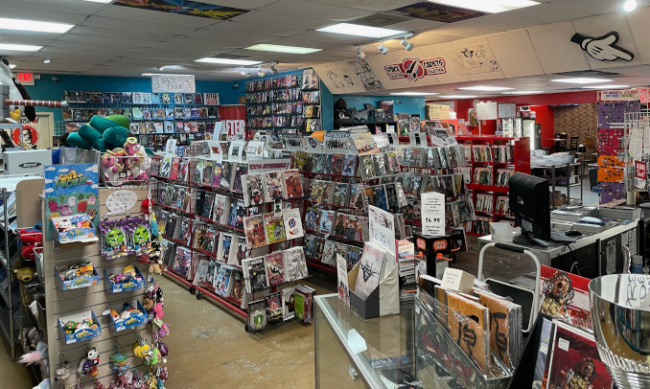
Says One of Her Basic Retailing Rules is Now 'A Complete Fiction,… A Complete Lie.'
Posted by Jim McLauchlin on March 16, 2022 @ 4:01 am CT



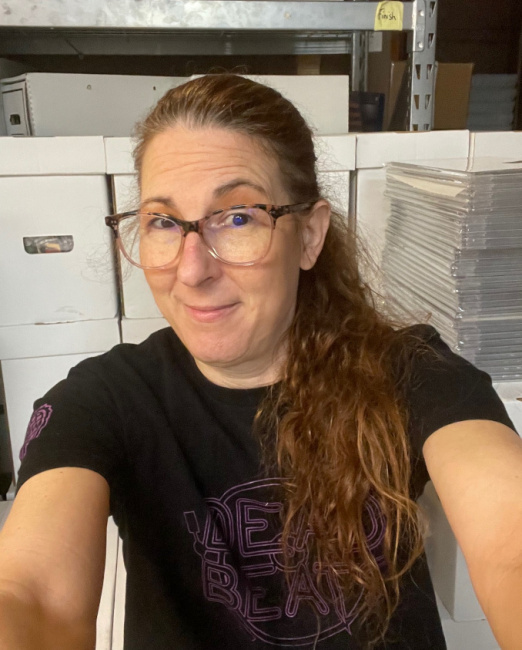
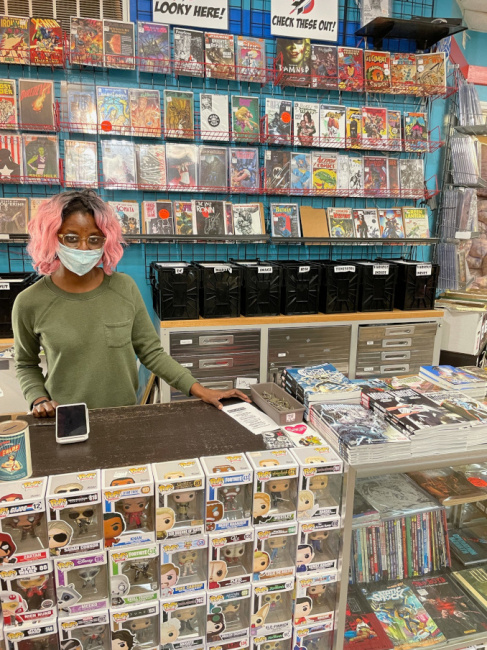
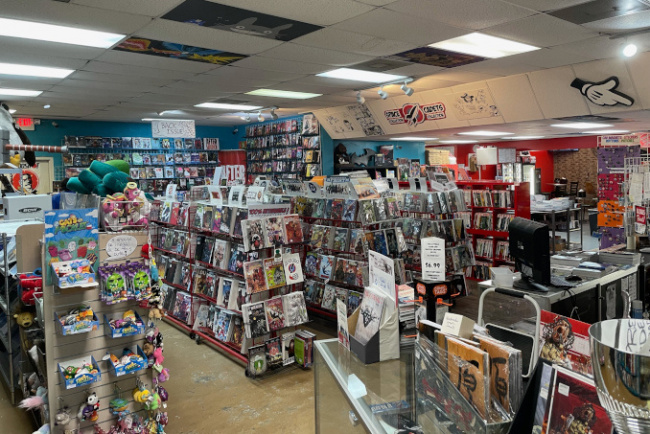
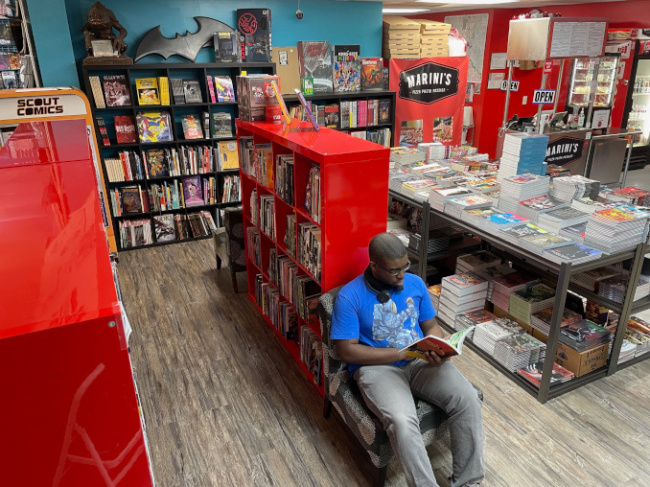
 View Gallery: 5 Images
View Gallery: 5 Images